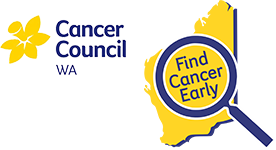Did you know?
- Bowel cancer is one of the most common cancers affecting both women and men in Western Australia.
- In 2019, 726 Western Australian men and 600 Western Australian women were diagnosed with bowel cancer.
- Bowel cancer is also known as colorectal cancer (cancers of the colon and rectum).
Common symptoms of bowel cancer include:
- Blood in your poo (once or more)
Or, for more than four weeks:
- A change in your normal bowel habit, such as runny poo, pooing more often or finding it hard to poo
- A new pain, lump or swelling in your tummy
- Feeling tired or looking pale
- Losing weight without trying
If you have noticed any blood in your poo or evidence of bleeding from your back passage (red or black blood), even if it was just once, it’s important to tell your doctor, clinic nurse or Aboriginal health worker straight away.
If you have had any of the other symptoms for more than four weeks, tell your doctor, nurse or health worker. It doesn’t mean you’ve got bowel cancer – often these symptoms turn out to be something less serious. But it’s important to tell your health professional and get checked out to be safe.
If it is bowel cancer, the earlier it’s found, the greater the chance of successful treatment.
For further information on symptoms related to other types of cancers, please click here.
What about screening?
Bowel cancer can also occur with no symptoms, so for Australians aged 50 to 74 NOT experiencing the symptoms above, it’s important to take part in the National Bowel Cancer Screening Program. The Program sends home test kits to eligible Australians every two years. These bowel cancer screening kits are designed for people who are NOT experiencing symptoms.
Waiting to participate in screening when you have a symptom could delay your diagnosis and risk a worse outcome. The best thing to do if you have a symptom is to tell your doctor, clinic nurse or Aboriginal health worker.
For more information visit the bowel cancer screening page on the Cancer Council website for more information.
